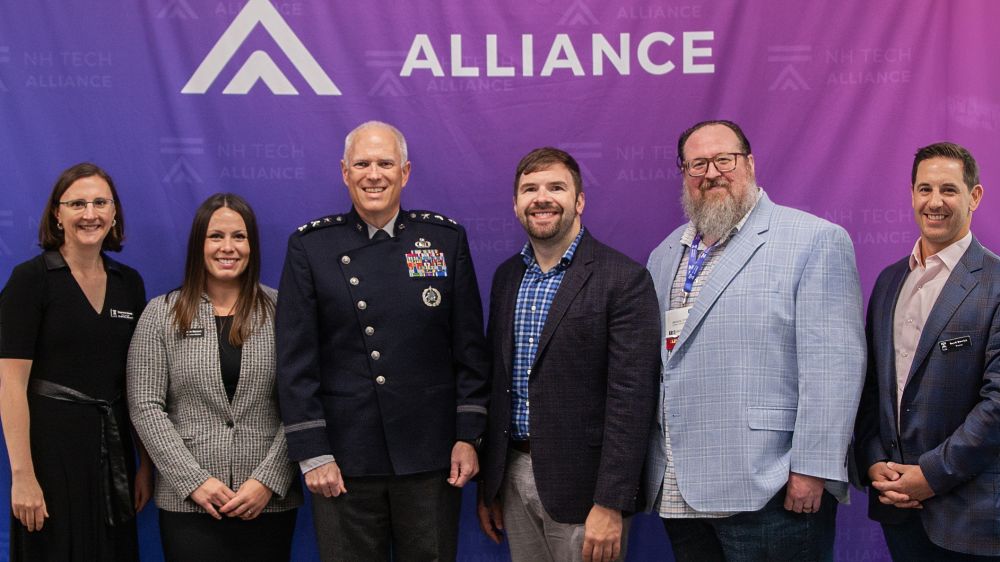
Particpants in the Northeast National Security Conference included, from left: Stephanie Baxter, VP of Membership & Operations, NH Tech Alliance; Julie Demers, Executive Director, NH Tech Alliance; Lt. General Philip A. Garrant, Commander, Space Systems Command; Jeremy Hitchcock, New North Ventures; Jeromy Grimmett, Calhar Industries; and Scott Merrick, Darby Field Advisors. (Photo: James Huddleston, EA Creative)
Leaders from NH’s tech industry, academia, and the U.S. Department of Defense (DoD) gathered at Saint Anselm College in Manchester on June 10 for the inaugural Northeast National Security Conference, hosted by the NH Tech Alliance.
The day-long event drew 180 participants eager to learn more about the opportunities of doing business with the DoD and highlighted the growing intersection between commercial innovation and national defense—particularly in space technology.
One clear message came early in day: the future of the country’s defense hinges as much on code and satellites as it once did on boots and tanks.
Lt. General Philip A. Garrant, commander of the U.S. Space Systems Command, delivered the keynote, warning that threats in space are already here. “Every satellite on orbit and every network is a viable target,” Garrant emphasized, explaining the Pentagon’s recent launch of Orbital Watch—a real-time threat data platform designed to bolster commercial resilience in space.
The conference also spotlighted the DoD’s multibillion-dollar “Golden Dome” initiative—part of the FY 2026 defense budget—aiming to develop a next-generation satellite architecture. “This level of investment reflects an urgent need,” Garrant stressed. “If we want to maintain assured access to space, we have to outpace peer competitors in both technology and deployment.”
Julie Demers, executive director of the NH Tech Alliance, says the event was designed to put a spotlight on the state's expanding role in defense innovation. “In the defense innovation space, New Hampshire has always punched above its weight—but we also wanted to make it clear that there’s space for smaller companies that haven’t engaged yet,” Demers said. “One challenge for them is simply getting a foot in the door.”
Demers says another goal of the conference was to highlight just how many innovation divisions exist within the DoD—and how many of them are actively seeking solutions that NH companies can provide. “We wanted to expose this as an opportunity for New Hampshire companies that have potential to serve the DoD and other clients,” she said, “and we wanted to put New Hampshire companies on a pedestal for people coming from around the country to show them how much is happening here.”
Among the conference sponsors was Trusted Internet, a cybersecurity firm that works closely with DoD contractor companies to ensure compliance with national security standards. Nathan Paddock, director of cybersecurity at Trusted Internet, said the company is particularly focused on helping small and midsized firms meet NIST 800-171 requirements—an essential cybersecurity standard for contractors handling Controlled Unclassified Information (CUI).
Paddock cited China’s history of industrial espionage—including theft of U.S. defense contractor data—as a key reason these requirements exist. “The NIST standards are designed to curb that kind of loss,” he said. “Every company that handles sensitive information for the DoD must meet those standards.”
Trusted Internet conducts gap analyses for companies aiming to become compliant and also offers 24/7 cybersecurity monitoring tailored to smaller firms’ budgets. “We’re looking to connect with New Hampshire and New England companies that might need our services,” Paddock said. “A lot of small businesses don’t have the resources of a BAE Systems, but they’re still critical parts of the supply chain. Our goal is to keep them protected while keeping costs manageable.”
And as the DoD ramps up efforts like the Golden Dome initiative, the pressure to meet high standards of cyber resilience will only grow. “Cybersecurity is foundational,” Paddock said. “If you want to be part of what’s next, you have to be ready.”
Andrew Mitchell, co-founder and president of Durham-based North Light AI, laid out additional hurdles small firms face when “trying to break in” to defense contracting. North Light AI uses machine learning to map supplier capabilities across the aerospace and defense supply chain—an essential service when prime contractors like Boeing need vetted small-business partners, Mitchell said.
“Right now there’s no consolidated database. We’ve got data scattered across federal registries and disparate systems,” Mitchell explained. “Our AI ingests supplier profiles, past performance records, even patent filings, and delivers a confidence score so prime contractors can find the right component maker quickly.”
Mitchell noted that North Light AI is collaborating with the NH Aerospace and Defense Consortium, a nonprofit incubator that serves DoD and prime contractors by strengthening the supply chain and accelerating speed-to-market.
Demers, who was pleased with the turnout and response from conferences attendees, said the NH Tech Alliance wants to continue promoting startups like North Light AI. The Alliance also supports the University of NH’s Space Technology Hub—an initiative designed to connect the commercial space sector with the decades of space research and expertise—which Lt. Gen. Garrant visited following the conference. “I’m confident this was the first of many national conferences,” Demers said. “We’re maintaining relationships with the organizations that came to this one, and we want to be a conduit—an additional resource in New Hampshire to help companies connect with what they need.”
